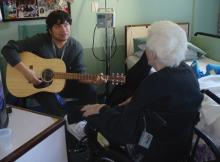SAN FRANCISCO – Music therapy can improve symptoms of depression and agitation in residents with dementia, according to researchers who described an innovative program in the MJHS health system* in New York.
"There was a major drop in agitation after 2 weeks of music therapy," said Dr. Mary S. Mittelman, director of the psychosocial research and support programs at nearby Langone Medical Center, and statistical analyst for the pilot program. "Depression went way down."
While most nursing homes offer music as passive entertainment, the researchers tried to systematically engage residents as active participants who move in time to the music, sing, or play instruments.
Music may stimulate people with dementia in a way that language cannot, said Jan Maier, RN, of the Research Triangle Institute International in Durham, N.C., who offered background information on music therapy. "In dementia, the parts of the brain that have to do with music and emotional memory are preserved," she said.
She cited anecdotal reports of people with dementia learning three-part rounds or recalling the words to long hymns they sang in their youth. In some documented cases, former professional musicians with such severe dementia that they couldn’t dress themselves have been able to play instruments in ensembles, she said.
"People who don’t remember their son or daughter who come to visit will remember the person who leads their music group, and say, ‘Do we have music today?’ " Ms. Maier said.
A handful of randomized controlled trials have shown reductions in agitation in patients with dementia who participate in music therapy, she said, citing among other studies one by researchers in Taipei, Taiwan, that recently documented the effect (Int. J. Geriatr. Psychiatry 2011 July;26:670-8 [doi: 10.1002/gps.2580]).
Music therapy has great potential in long-term care, Dr. Mittelman said, since about 70% of nursing home residents over age 75 years suffer from dementia.
The MJHS health system* developed protocols in which the residents sang along or moved in time to the music, and others that incorporated music into activities of daily living, such as wound care, bathing, and range-of-motion exercises.
In a video demonstrating a typical session, women waved scarves in time to big band music. "The movement intervention worked best," said Kendra Ray, a music therapist* who directed the project.
Dr. Mittelman said the researchers collected data on 84 people, of whom 8 had agitation, 42 had depression, and 34 were wanderers. The research showed an average one-third drop on the Cohen-Mansfield Agitation Inventory and a similar improvement in depression, measured by the Dementia Mood Picture Test. Depression returned when the music therapists left and certified nursing assistants took over the activities. Results from the Algase Wandering Scale were inconsistent. Dr. Mittelman acknowledged that the data were only preliminary and that larger studies should be conducted.
But, as another measure of success, Dr. Mittelman said that some of the participants’ families testified about the benefits of the program. Some said that they enjoyed their visits more because the residents’ moods had improved so much. "My Mom is more upbeat, more attentive, and talkative," one wrote. And, at times, residents picked up instruments to practice on their own, outside of music-therapy hours.
If you are trying to address specific behaviors, Dr. Mittelman advised, time the therapy for when these behaviors are likely to occur. For example, if someone wanders in the evening, play music at that time. But don’t play music all day. That can become irritating, she said.
When designing a music-therapy program for an individual, "Pick the music that person loved," Dr. Mittelman said. "If you don’t know, go to their early adult years. If they like it, they’ll let you know right away."
Dr. Mittelman and Ms. Ray said they had no conflict of interest on the topic.
* CORRECTION, 6/3/2011: The original version of this article referred to the MJHS health system as the Metropolitan Jewish Health System. This version has been updated. Also, Kendra Ray was incorrectly referred to as an art therapist. She is a music therapist. We regret the error.


